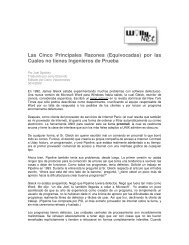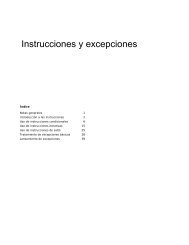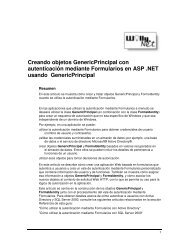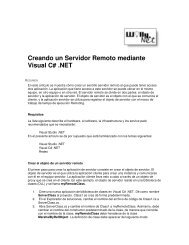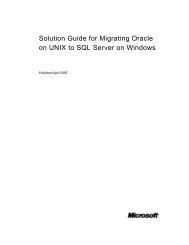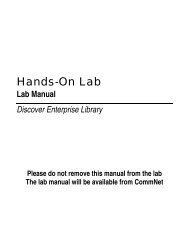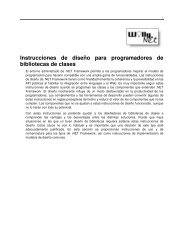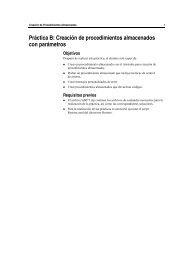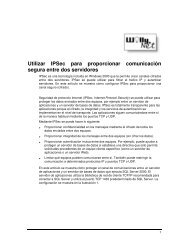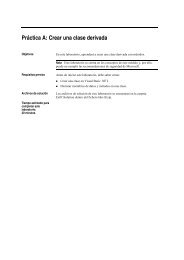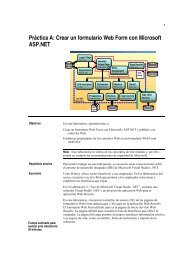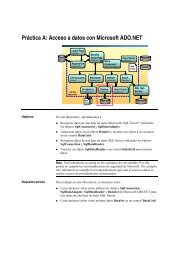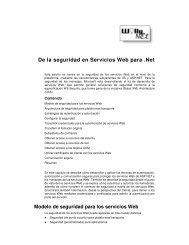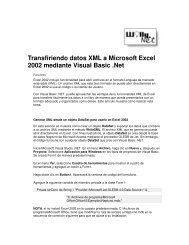- Page 1:
Standard ECMA-3342nd edition - Dece
- Page 5:
Brief historyThis International Sta
- Page 8:
C# LANGUAGE SPECIFICATION9.3.3 Whit
- Page 13 and 14:
Table of Contents18.3.5 Boxing and
- Page 15 and 16:
Table of ContentsA.2.12 Attributes.
- Page 17:
Chapter 1 Scope1. ScopeThis clause
- Page 20 and 21:
C# LANGUAGE SPECIFICATIONA conformi
- Page 23 and 24:
Chapter 4 Definitions4. Definitions
- Page 25 and 26:
Chapter 5 Notational conventions5.
- Page 29:
Chapter 7 General description7. Gen
- Page 32 and 33:
C# LANGUAGE SPECIFICATION• The pr
- Page 34 and 35:
C# LANGUAGE SPECIFICATIONresults in
- Page 36 and 37:
C# LANGUAGE SPECIFICATION8.2.3 Arra
- Page 38 and 39:
C# LANGUAGE SPECIFICATIONclass Test
- Page 40 and 41:
C# LANGUAGE SPECIFICATIONpre: x = 1
- Page 42 and 43:
C# LANGUAGE SPECIFICATION}public vo
- Page 44 and 45:
C# LANGUAGE SPECIFICATIONPrecedence
- Page 46 and 47:
C# LANGUAGE SPECIFICATIONdo stateme
- Page 48 and 49:
C# LANGUAGE SPECIFICATION}}set {MyF
- Page 50 and 51:
C# LANGUAGE SPECIFICATION}public st
- Page 52 and 53:
C# LANGUAGE SPECIFICATIONButton b =
- Page 54 and 55:
C# LANGUAGE SPECIFICATIONclass Test
- Page 56 and 57:
C# LANGUAGE SPECIFICATIONThe exampl
- Page 58 and 59:
C# LANGUAGE SPECIFICATIONstructs ar
- Page 60 and 61:
C# LANGUAGE SPECIFICATIONAn interes
- Page 62 and 63:
C# LANGUAGE SPECIFICATIONThe next s
- Page 64 and 65: C# LANGUAGE SPECIFICATION// Author
- Page 67 and 68: Chapter 9 Lexical structure9. Lexic
- Page 69 and 70: Chapter 9 Lexical structure9.3.2 Co
- Page 71 and 72: Chapter 9 Lexical structureclass Cl
- Page 73 and 74: Chapter 9 Lexical structurekeyword:
- Page 75 and 76: Chapter 9 Lexical structurereal-typ
- Page 77 and 78: Chapter 9 Lexical structureverbatim
- Page 79 and 80: Chapter 9 Lexical structure#if Bvoi
- Page 81 and 82: Chapter 9 Lexical structure#define
- Page 83 and 84: Chapter 9 Lexical structureclass He
- Page 85 and 86: Chapter 10 Basic concepts10. Basic
- Page 87 and 88: Chapter 10 Basic concepts• Each b
- Page 89 and 90: Chapter 10 Basic concepts• The me
- Page 91 and 92: Chapter 10 Basic concepts• If the
- Page 93 and 94: Chapter 10 Basic concepts10.5.3 Pro
- Page 95 and 96: Chapter 10 Basic conceptsdeclared i
- Page 97 and 98: Chapter 10 Basic conceptsIn the F m
- Page 99 and 100: Chapter 10 Basic conceptsclass Deri
- Page 101 and 102: Chapter 10 Basic conceptsnamespace
- Page 103: Chapter 10 Basic concepts}}// A and
- Page 106 and 107: C# LANGUAGE SPECIFICATIONfloating-p
- Page 108 and 109: C# LANGUAGE SPECIFICATION• The by
- Page 110 and 111: C# LANGUAGE SPECIFICATION11.1.6 The
- Page 112 and 113: C# LANGUAGE SPECIFICATION11.2.4 Int
- Page 116 and 117: C# LANGUAGE SPECIFICATION12.1.2.2 I
- Page 118 and 119: C# LANGUAGE SPECIFICATION[Note: Ini
- Page 120 and 121: C# LANGUAGE SPECIFICATION• The de
- Page 122 and 123: C# LANGUAGE SPECIFICATION12.3.3.10
- Page 124 and 125: C# LANGUAGE SPECIFICATION}}end exam
- Page 126 and 127: C# LANGUAGE SPECIFICATION• The de
- Page 128 and 129: C# LANGUAGE SPECIFICATION12.4 Varia
- Page 130 and 131: C# LANGUAGE SPECIFICATION• From u
- Page 132 and 133: C# LANGUAGE SPECIFICATION• From d
- Page 134 and 135: C# LANGUAGE SPECIFICATIONcopying th
- Page 136 and 137: C# LANGUAGE SPECIFICATIONencompassi
- Page 139 and 140: Chapter 14 Expressions14. Expressio
- Page 141 and 142: Chapter 14 ExpressionsSection Categ
- Page 143 and 144: Chapter 14 Expressionsset of candid
- Page 145 and 146: Chapter 14 Expressionsa compile-tim
- Page 147 and 148: Chapter 14 ExpressionsConstruct Exa
- Page 149 and 150: Chapter 14 Expressions• For a val
- Page 151 and 152: Chapter 14 Expressionsfor a value p
- Page 153 and 154: Chapter 14 Expressions• If the co
- Page 155 and 156: Chapter 14 Expressionsenclosing blo
- Page 157 and 158: Chapter 14 Expressions• Otherwise
- Page 159 and 160: Chapter 14 Expressions14.5.5.2 Dele
- Page 161 and 162: Chapter 14 Expressions• When this
- Page 163 and 164: Chapter 14 ExpressionsThe optional
- Page 165 and 166:
Chapter 14 Expressionsint[,] = new
- Page 167 and 168:
Chapter 14 Expressions[Example: The
- Page 169 and 170:
Chapter 14 Expressionsclass Test{st
- Page 171 and 172:
Chapter 14 Expressions14.6.5 Prefix
- Page 173 and 174:
Chapter 14 ExpressionsThe product i
- Page 175 and 176:
Chapter 14 Expressions+y -y +0 -0 +
- Page 177 and 178:
Chapter 14 Expressionsthe result of
- Page 179 and 180:
Chapter 14 ExpressionsWhen declarin
- Page 181 and 182:
Chapter 14 Expressions14.9.2 Floati
- Page 183 and 184:
Chapter 14 Expressionsusing System;
- Page 185 and 186:
Chapter 14 ExpressionsOtherwise, le
- Page 187 and 188:
Chapter 14 Expressions• The opera
- Page 189 and 190:
Chapter 14 ExpressionsIf the left o
- Page 191 and 192:
Chapter 14 ExpressionsThe second ru
- Page 193 and 194:
Chapter 15 Statements15. Statements
- Page 195 and 196:
Chapter 15 Statements15.2 BlocksA b
- Page 197 and 198:
Chapter 15 Statementslocal-variable
- Page 199 and 200:
Chapter 15 Statementsif (x) {if (y)
- Page 201 and 202:
Chapter 15 Statementsswitch (i) {ca
- Page 203 and 204:
Chapter 15 Statementswhile-statemen
- Page 205 and 206:
Chapter 15 StatementsThe type and i
- Page 207 and 208:
Chapter 15 Statementsusing System;c
- Page 209 and 210:
Chapter 15 Statements}Console.Write
- Page 211 and 212:
Chapter 15 Statements15.10 The try
- Page 213 and 214:
Chapter 15 Statementsconsidered a m
- Page 215 and 216:
Chapter 15 StatementsLocal variable
- Page 217 and 218:
Chapter 16 Namespaces16. Namespaces
- Page 219 and 220:
Chapter 16 Namespacesusing-directiv
- Page 221 and 222:
Chapter 16 Namespacesthe last using
- Page 223:
Chapter 16 Namespaces16.4 Namespace
- Page 226 and 227:
C# LANGUAGE SPECIFICATION• An abs
- Page 228 and 229:
C# LANGUAGE SPECIFICATION17.2 Class
- Page 230 and 231:
C# LANGUAGE SPECIFICATION17.2.4 Con
- Page 232 and 233:
C# LANGUAGE SPECIFICATION17.2.6.3 H
- Page 234 and 235:
C# LANGUAGE SPECIFICATIONdeclaratio
- Page 236 and 237:
C# LANGUAGE SPECIFICATIONThe value
- Page 238 and 239:
C# LANGUAGE SPECIFICATIONand instan
- Page 240 and 241:
C# LANGUAGE SPECIFICATION}static vo
- Page 242 and 243:
C# LANGUAGE SPECIFICATIONclass B{pu
- Page 244 and 245:
C# LANGUAGE SPECIFICATION• If the
- Page 246 and 247:
C# LANGUAGE SPECIFICATIONIn a metho
- Page 248 and 249:
C# LANGUAGE SPECIFICATIONusing Syst
- Page 250 and 251:
C# LANGUAGE SPECIFICATIONusing Syst
- Page 252 and 253:
C# LANGUAGE SPECIFICATIONclass B: A
- Page 254 and 255:
C# LANGUAGE SPECIFICATIONclass B: A
- Page 256 and 257:
C# LANGUAGE SPECIFICATIONproperty-m
- Page 258 and 259:
C# LANGUAGE SPECIFICATION}public st
- Page 260 and 261:
C# LANGUAGE SPECIFICATIONHad x and
- Page 262 and 263:
C# LANGUAGE SPECIFICATIONX is a vir
- Page 264 and 265:
C# LANGUAGE SPECIFICATION}void Canc
- Page 266 and 267:
C# LANGUAGE SPECIFICATION[Example:
- Page 268 and 269:
C# LANGUAGE SPECIFICATIONThe type o
- Page 270 and 271:
C# LANGUAGE SPECIFICATIONusing Syst
- Page 272 and 273:
C# LANGUAGE SPECIFICATIONThe true a
- Page 274 and 275:
C# LANGUAGE SPECIFICATION17.10 Inst
- Page 276 and 277:
C# LANGUAGE SPECIFICATIONusing Syst
- Page 278 and 279:
C# LANGUAGE SPECIFICATION}end examp
- Page 280 and 281:
C# LANGUAGE SPECIFICATIONusing Syst
- Page 283 and 284:
Chapter 18 Structs18. StructsStruct
- Page 285 and 286:
Chapter 18 StructsPoint a = new Poi
- Page 287 and 288:
Chapter 18 Structsstruct Point{int
- Page 289 and 290:
Chapter 18 Structs}public static DB
- Page 291 and 292:
Chapter 19 Arrays19. ArraysAn array
- Page 293 and 294:
Chapter 19 ArraysThe assignment to
- Page 295 and 296:
Chapter 20 Interfaces20. Interfaces
- Page 297 and 298:
Chapter 20 Interfaces}string this[i
- Page 299 and 300:
Chapter 20 Interfacesinterface IInt
- Page 301 and 302:
Chapter 20 InterfacesHere, class Te
- Page 303 and 304:
Chapter 20 Interfaces• If S conta
- Page 305 and 306:
Chapter 20 Interfacesinterface Inte
- Page 307 and 308:
Chapter 20 InterfacesInherited publ
- Page 309 and 310:
Chapter 21 Enums21. EnumsAn enum ty
- Page 311 and 312:
Chapter 21 Enums[Example: The examp
- Page 313 and 314:
Chapter 22 Delegates22. Delegates[N
- Page 315 and 316:
Chapter 22 Delegates22.2 Delegate i
- Page 317:
Chapter 22 Delegatesend example]Tes
- Page 320 and 321:
C# LANGUAGE SPECIFICATIONthe run-ti
- Page 322 and 323:
C# LANGUAGE SPECIFICATIONusing Syst
- Page 324 and 325:
C# LANGUAGE SPECIFICATIONattribute-
- Page 326 and 327:
C# LANGUAGE SPECIFICATION[X]class C
- Page 328 and 329:
C# LANGUAGE SPECIFICATIONLet Name b
- Page 330 and 331:
C# LANGUAGE SPECIFICATION// Begin c
- Page 333 and 334:
Chapter 25 Unsafe code25. Unsafe co
- Page 335 and 336:
Chapter 25 Unsafe codethe unsafe mo
- Page 337 and 338:
Chapter 25 Unsafe codeA pointer-typ
- Page 339 and 340:
Chapter 25 Unsafe codecorrectly ali
- Page 341 and 342:
Chapter 25 Unsafe codeend example]u
- Page 343 and 344:
Chapter 25 Unsafe codeT* operator -
- Page 345 and 346:
Chapter 25 Unsafe codedeclaration,
- Page 347 and 348:
Chapter 25 Unsafe codeclass Test{un
- Page 349 and 350:
Chapter 25 Unsafe code}public stati
- Page 351 and 352:
Appendix A GrammarA. GrammarThis cl
- Page 353 and 354:
Appendix A Grammaridentifier-or-key
- Page 355 and 356:
Appendix A Grammarcharacter::single
- Page 357 and 358:
Appendix A Grammarpp-endif::whitesp
- Page 359 and 360:
Appendix A Grammararray-type:non-ar
- Page 361 and 362:
Appendix A Grammarpre-decrement-exp
- Page 363 and 364:
Appendix A Grammarlocal-variable-in
- Page 365 and 366:
Appendix A Grammarspecific-catch-cl
- Page 367 and 368:
Appendix A Grammarconstant-declarat
- Page 369 and 370:
Appendix A Grammaraccessor-body:blo
- Page 371 and 372:
Appendix A Grammarstatic-constructo
- Page 373 and 374:
Appendix A Grammarinterface-accesso
- Page 375 and 376:
Appendix A Grammarnamed-argument-li
- Page 377 and 378:
Appendix B Portability issuesB. Por
- Page 379 and 380:
Appendix C Naming guidelinesC. Nami
- Page 381 and 382:
Appendix C Naming guidelines• Do
- Page 383 and 384:
Appendix C Naming guidelinespublic
- Page 385 and 386:
Appendix D Standard LibraryD. Stand
- Page 387 and 388:
Appendix D Standard Librarypublic o
- Page 389 and 390:
Appendix D Standard Library}public
- Page 391 and 392:
Appendix D Standard Library// Names
- Page 393 and 394:
Appendix D Standard Library}public
- Page 395 and 396:
Appendix D Standard Library}public
- Page 397 and 398:
Appendix D Standard Librarypublic s
- Page 399 and 400:
Appendix D Standard Librarypublic s
- Page 401 and 402:
Appendix D Standard Library}public
- Page 403 and 404:
Appendix D Standard Librarypublic D
- Page 405 and 406:
Appendix D Standard Library}public
- Page 407 and 408:
Appendix D Standard Library}public
- Page 409 and 410:
Appendix D Standard Library}public
- Page 411 and 412:
Appendix D Standard Library}public
- Page 413 and 414:
Appendix D Standard Library}Open =
- Page 415 and 416:
Appendix D Standard Library{}public
- Page 417 and 418:
Appendix D Standard Library// Names
- Page 419 and 420:
Appendix D Standard Library// Names
- Page 421 and 422:
Appendix D Standard Library// Names
- Page 423 and 424:
Appendix D Standard Library}public
- Page 425 and 426:
Appendix D Standard Library}public
- Page 427 and 428:
Appendix D Standard Library{}public
- Page 429 and 430:
Appendix D Standard Library}public
- Page 431 and 432:
Appendix D Standard Library}Current
- Page 433 and 434:
Appendix D Standard Library}public
- Page 435 and 436:
Appendix D Standard Library}public
- Page 437 and 438:
Appendix D Standard Library}public
- Page 439 and 440:
Appendix D Standard Libraryprotecte
- Page 441 and 442:
Appendix D Standard Library}public
- Page 443 and 444:
Appendix D Standard Library}public
- Page 445 and 446:
Appendix D Standard Library}public
- Page 447 and 448:
Appendix D Standard Library}public
- Page 449 and 450:
Appendix E Documentation CommentsE.
- Page 451 and 452:
Appendix E Documentation CommentsEx
- Page 453 and 454:
Appendix E Documentation CommentsE.
- Page 455 and 456:
Appendix E Documentation CommentsEx
- Page 457 and 458:
Appendix E Documentation CommentsCh
- Page 459 and 460:
Appendix E Documentation Comments
- Page 461 and 462:
Appendix E Documentation Comments//
- Page 463 and 464:
Appendix E Documentation CommentsPo
- Page 465 and 466:
Appendix F IndexF. IndexThis clause
- Page 467 and 468:
Appendix F Indexmethod call .......
- Page 469 and 470:
Appendix F Indexform feed..........
- Page 471 and 472:
Appendix F Indexbetter ............
- Page 473 and 474:
Appendix F Indexescape sequencealer
- Page 475 and 476:
Appendix F Indexconversion to......
- Page 477 and 478:
Appendix F Indexmember lookup .....
- Page 479 and 480:
Appendix F Index^ See ^^= .........
- Page 481 and 482:
Appendix F Indexincrementing a.....
- Page 483 and 484:
Appendix F Indexbreak .............
- Page 485 and 486:
Appendix F Indextrue...............
- Page 487:
Appendix F Indexiteration .........
- Page 490:
ECMA114 Rue du RhôneCH-1204 Geneva



